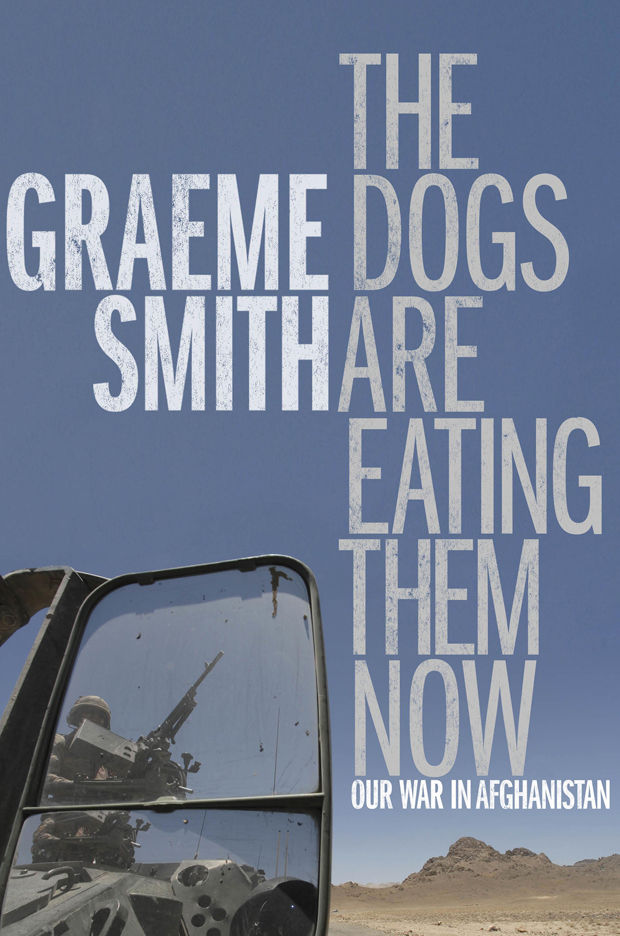Canada will officially end its military engagement in Afghanistan in March 2014 after losing 158 Canadian Forces personnel and spending billions of dollars on the war effort. So, was it worth it?
You won’t find the answer in Graeme Smith’s award-winning retrospective The Dogs Are Eating Them Now on his time as a foreign correspondent for the Globe and Mail. In fact, you’ll only find more questions that beg for answers — and our collective attention.
If you rely on the Canadian government for answers, you’ll get jingoistic claims of success — including that Canada successfully secured Kandahar (the size of Nova Scotia) “with just 2,500 soldiers,” without a hint that anything ever went wrong beyond the initial deployment.
That’s contradicted in Smith’s first line of the book. “We lost the war in Southern Afghanistan, and it broke my heart,” he writes in the beginning of an engrossing narrative, chronicling four years of his time spent investigating the mission and its repercussions. We’ll recall some of his stories: interviews with detainees claiming torture at the hands of Afghan captors, which threatened to sink the Conservative minority government with its first scandal, as well as an acclaimed Emmy-winning video series called “Talking to the Taliban” that offered rare insight into the mind frames of those fighting against Western forces.
But there are underlying themes that many Canadians will likely not have picked up on; themes that slowly begin to dawn on Smith as he becomes further embedded in the country. They include the realizations that far too many mistakes were made by international forces and that there were far too many miscalculations and misunderstandings about just how to bring peace and stability to a land desperate for it.
With a backdrop that includes soldiers shooting rockets that individually cost the same as a luxury car, Smith picks up on a feeling of futility. “The war may have felt justified in our guts, but it played out in southern Afghanistan like a farce.” By the time NATO had arrived in the country, the terrorists responsible for September 11 were gone, he reflects. And while Canada, along with its international partners, can talk about successes including greater access to education and lower rates of child mortality, there are huge question marks as to whether the successes can be sustained when the world packs up and leaves (Smith pleads for “continued engagement”).
Indeed, much of the Afghan economy is a bubble, writes Smith, created with war money used to buy peace. And yet, a rising insurgency erases any kind of progress; new schools are transformed into livestock sheds.
The tragedy is that the influx of troops did not lead to widespread stabilization expected by the war planners. Rather, as Smith painfully concludes, more troops only led to increased animosity on the part of local Afghans who saw attacks on their villages, and support for a corrupt and meddling government, as legitimate reasons to join the Taliban, seeking revenge.
“Sir, is there any time in real life when it would make sense to kick a hornet’s nest?” Smith asks one general who uses the metaphor to explain why the stronger troop presence had led to rising attacks.
Smith is a generous narrator, bringing the reader right inside his head as he tries to make sense of what he is witnessing. This book takes us beyond the “neutral” narrative; we feel his angst as he begins to realize that this isn’t a clear-cut good-guys-versus-bad-guys story at all and that the “grand vision” which even he believed in would fail in bringing the country peace, democracy and the rule of law.
“Writing this book tears me apart sometimes,” he writes. “I keep typing curses into the text, streams of invective that I go back and delete, feeling ashamed of my failure to find better words than fuck, fuck, fuck. But I also need you to feel the profanity, because there is something profane about the errors we committed in Afghanistan.”
One can understand why writing this book was important — not just for Smith, who explains how he couldn’t put the experience into words when friends and family would ask him about it. But important for all Canadians, who all too easily forgot or ignored dispatches chronicling the latest firefight or friendly fire incident.
Smith became intimately connected to the story, having visited Afghanistan 17 times between 2005 and 2011.
“I spent a lot of days smelling the death, getting sunburns. The charred flesh of suicide bombers got stuck in the treads of my shoes. I was shot at, bombed, rocketed, mortared, chased through narrow streets. I took photographs, recorded audio, filled a suitcase with leather-bound notebooks.”
Within those notebooks, a narrative about “self-defeating policies” would emerge. These would include misguided attempts to eradicate poppy fields, threatening the livelihood of whole villages without offering alternatives; working with Afghan forces that are “untrustworthy”; misunderstanding tribal conflicts and sensitivities; supporting a government that people consider “morally and economically bankrupt”; and a lack of communication between soldiers and those higher in command.
Smith, now a senior analyst with the International Crisis Group, has contributed much to our understanding of what was happening in our name, thousands of miles away.
“Afghanistan was an unsuccessful laboratory for ideas about how to fix a ruined country,” he concludes. “It’s morally unacceptable to claim success in a few limited areas — child mortality, access to education, and walk away. At best, we are leaving behind an ongoing war. At worst, it’s a looming disaster.”
Let’s hope Canada — and other nations — take heed.
Graeme Smith will be in Toronto on March 7, 2014, to take part in “An evening with the 2014 RBC Taylor Prize Finalists”. For more information, click here.
Amira Elghawaby is a contributing editor at rabble. Follow her on twitter @AmiraElghawaby



